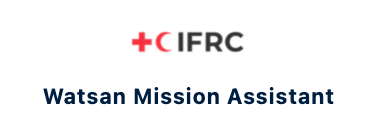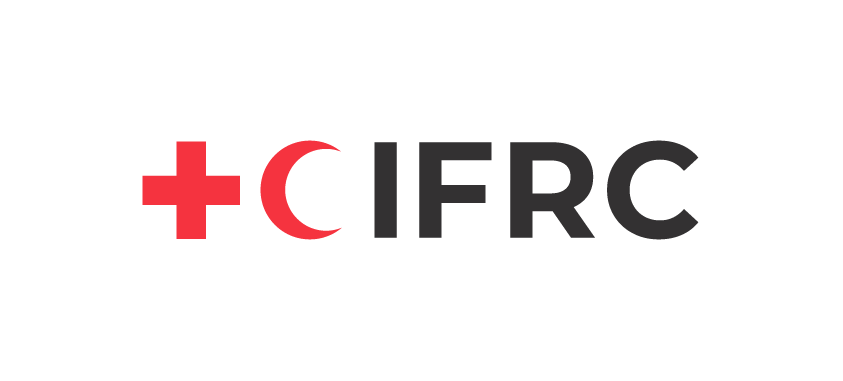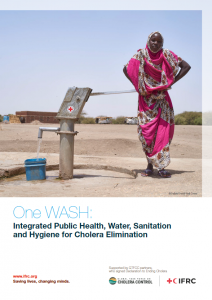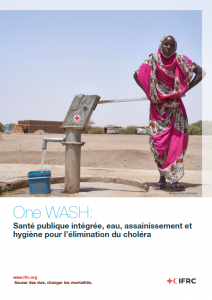
One WASH
One WASH promotes a common yet adaptable approach among National Red Cross Red Crescent Societies to establish large-scale, long-term sustainable water and sanitation programmes and to broaden its scope to prioritize its impact in cholera elimination, nutrition, provision of water for livestock, strengthening delivery of improved hygiene and in both rural and urban settings. This new, broadened initiative reflects our approach in integrating WASH and Health in a more sustainable solution to the holistic needs of vulnerable populations.
Every case and death from cholera is preventable with the tools we have today: effective cholera prevention and control interventions are well established. However, current efforts focus more on emergency response that have a minor impact on long-term control or elimination of cholera over time.
Guidelines and tools
Red Cross Red Crescent Guidelines and tools
One WASH brochures
Implementing One WASH
One WASH focuses on 20 cholera-affected countries initially where National Red Cross and Red Crescent Societies are committed to the elimination of the disease. The strategy focuses on two main actions that are closely interlinked and operate in full alignment with the GTFCC cholera road map, the Global Water and Sanitation Initiative, and IFRC cholera strategy.

Improve preparedness, early detection, and response to contain cholera outbreaks
The One WASH programme will support communities to be well prepared for early response when an outbreak happens. It will support existing health care systems with community-based surveillance for early detection and monitoring of diarrhoeal outbreaks at the community level. It will also improve access to care by providing community level treatment through provision of oral rehydration therapy, setting up oral rehydration points and referrals of severe cases. Prevention activities such as water treatment, hygiene and health promotion are included as key parts of the approach to managing outbreaks. In addition, the approach will focus upon supporting local governments and partners with oral vaccination campaigns, as appropriate
A long-term integrated WASH approach to prevent cholera
One WASH will invest in sustainable long-term WASH programmes, increasing access to levels that will reduce and prevent cholera. Year-round health and hygiene behavior change communication and social marketing programmes will be implemented in communities, including advocacy and support to cholera vaccination campaigns. One WASH aims to improve access to safe water and adequate sanitation by constructing and rehabilitating facilities, as well as supporting the application of good hygiene practices and community water management. Hygiene behavior change interventions are delivered to ensure communities understand which hygiene practices may contribute to their increased risk of disease and which may play a preventative role.
Related Documents
External Guidelines and tools
The Global Task Force on Cholera Control (GTFCC) brings together all multi-sector technical partners from around the world to support countries in their fight against cholera, offering an effective and well-coordinated platform whose secretariat is hosted by the World Health Organization (WHO). Launching the strategy titled Ending Cholera: A Global Roadmap to 2030, the GTFCC partners aim to reduce global cholera deaths by 90%. With the commitment of cholera-affected countries, technical partners, and donors, as many as 20 countries could eliminate disease transmission by 2030.
For more information regarding Global Task Force on Cholera Control
Learning resources
External Learning resources
Resources and links
Other Cholera Resources
- Global Cholera Epidemiology: Opportunities to Reduce the Burden of Cholera by 2030.
- Broad approaches to cholera control in Asia: Water, sanitation and handwashing. Vaccine, August 2019.
- Formative research for the design of a scalable water, sanitation, and hygiene mobile health program: CHoBI7 mobile health program.
- Technical Note: Water, Sanitation and Hygiene and Infection Prevention and Control in Cholera Treatment Structures.
- Assessment of Recommendation for the Containment and Disinfection of Human Excreta in Cholera Treatment Centers. Water, January 2019.
- Recurrent Cholera Outbreaks, Democratic Republic of the Congo, 2008–2017. EID, May 2019.
- Drinking water quality and human dimensions of cholera patients to inform evidence-based prevention investment in Karonga District, Malawi.
- A Systematic Review and Meta-Analysis of the Association between Water, Sanitation, and Hygiene Exposures and Cholera in Case–Control Studies. Am J Trop Med Hyg, August 2018.
- Cholera prevention and control in refugee settings: Successes and continued challenges.
- Feasibility of a Comprehensive Targeted Cholera (CTI) Intervention in The Kathmandu Valley, Nepal.
- Global oral cholera vaccine use, 2013–2018. Vaccine, September 2019.
- Cholera control and prevention: Role of evidence-based advocacy and communications. Vaccine, June 2019.
- Modeling cholera dynamics at multiple scales: environmental evolution, between-host transmission, and within-host interaction.
- Individual and household exposures associated with cholera transmission in case–control studies: a systematic review. Trop Med Intl Health, July 2019.
- Risk factors associated with the recent cholera outbreak in Yemen: a case-control study. Epidemiol Health, April 2019.
- Micro-Hotspots of Risk in Urban Cholera Epidemics.
- Environmental reservoirs of Vibrio cholerae. Vaccine, July 2019.
- Cholera surveillance and estimation of burden of cholera. Vaccine, July 2019.
- Household Water Treatment and Cholera Control
- Quick impact projects have a long-term effect on cholera in Yemen. UNICEF, August 2019.
- Evaluation of an Emergency Bulk Chlorination Project Targeting Drinking Water Vendors in Cholera-Affected Wards of Dar es Salaam and Morogoro, Tanzania.
- Responding to epidemics in large-scale humanitarian crises: a case study of the cholera response in Yemen, 2016–2018.
- Neutralization of cholera toxin by Rosaceae family plant extracts.
- Feasibility of a Comprehensive Targeted Cholera (CTI) Intervention in The Kathmandu Valley, Nepal.
- Estimating cholera incidence with cross-sectional serology.
- Non-vaccine strategies for cholera prevention and control: India’s preparedness for the global roadmap. Vaccine, August 2019.
- The case-area targeted rapid response strategy to control cholera in Haiti: a four-year implementation study. PLoS NTDs, April 2019.
- Food insecurity and self-reported cholera in Haitian households: An analysis of the 2012 Demographic and Health Survey. PLoS NTDs, January 2019.
- Exploring the development of a household cholera-focused health literacy scale in James Town, Accra.
To include resources on this page, or for more information on IFRC initiatives please contact: wash.geneva@ifrc.org


